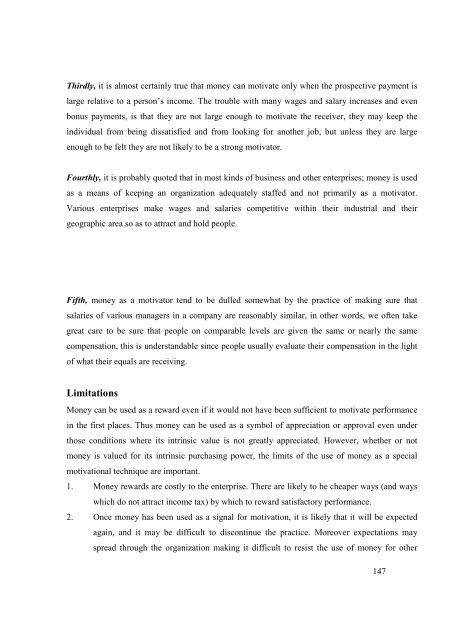HCM 433 MANGEMENT AND ORGANIZATIONAL BEHAVIOUR.pdf
HCM 433 MANGEMENT AND ORGANIZATIONAL BEHAVIOUR.pdf
HCM 433 MANGEMENT AND ORGANIZATIONAL BEHAVIOUR.pdf
You also want an ePaper? Increase the reach of your titles
YUMPU automatically turns print PDFs into web optimized ePapers that Google loves.
Thirdly, it is almost certainly true that money can motivate only when the prospective payment is<br />
large relative to a person’s income. The trouble with many wages and salary increases and even<br />
bonus payments, is that they are not large enough to motivate the receiver, they may keep the<br />
individual from being dissatisfied and from looking for another job, but unless they are large<br />
enough to be felt they are not likely to be a strong motivator.<br />
Fourthly, it is probably quoted that in most kinds of business and other enterprises; money is used<br />
as a means of keeping an organization adequately staffed and not primarily as a motivator.<br />
Various enterprises make wages and salaries competitive within their industrial and their<br />
geographic area so as to attract and hold people.<br />
Fifth, money as a motivator tend to be dulled somewhat by the practice of making sure that<br />
salaries of various managers in a company are reasonably similar, in other words, we often take<br />
great care to be sure that people on comparable levels are given the same or nearly the same<br />
compensation, this is understandable since people usually evaluate their compensation in the light<br />
of what their equals are receiving.<br />
Limitations<br />
Money can be used as a reward even if it would not have been sufficient to motivate performance<br />
in the first places. Thus money can be used as a symbol of appreciation or approval even under<br />
those conditions where its intrinsic value is not greatly appreciated. However, whether or not<br />
money is valued for its intrinsic purchasing power, the limits of the use of money as a special<br />
motivational technique are important.<br />
1. Money rewards are costly to the enterprise. There are likely to be cheaper ways (and ways<br />
which do not attract income tax) by which to reward satisfactory performance.<br />
2. Once money has been used as a signal for motivation, it is likely that it will be expected<br />
again, and it may be difficult to discontinue the practice. Moreover expectations may<br />
spread through the organization making it difficult to resist the use of money for other<br />
147
















